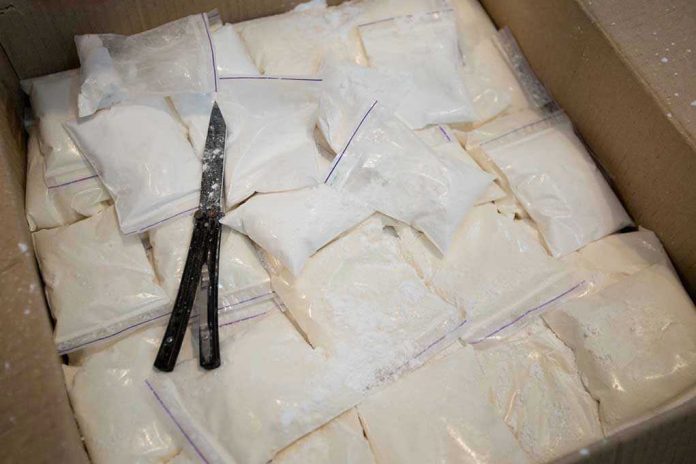
A Florida boater’s discovery of 50 pounds of cocaine floating in the ocean has sparked an investigation that underscores the critical role of civilians in the war against drug trafficking.
Story Snapshot
- A boater found 50 pounds of cocaine floating in the ocean and reported it to the authorities.
- The sheriff’s office secured the drugs, handing them over to U.S. Customs and Border Protection (CBP).
- Civilian involvement highlights the importance of public participation in combating drug smuggling.
- The incident is part of a broader trend of maritime drug trafficking in the Caribbean and Gulf regions.
Civilian Discovery and Law Enforcement Response
A private boater came across suspicious packages while out at sea, which were suspected to contain illegal narcotics. Upon discovery, the boater promptly contacted local law enforcement, exemplifying the crucial role civilians can play in national security. The local sheriff’s office then took charge, securing the scene and the packages before transferring them to U.S. Customs and Border Protection (CBP) for a comprehensive federal investigation and processing.
This event is a testament to effective interagency cooperation in combating maritime drug trafficking. The rapid response of local authorities, followed by a seamless transition to federal agencies, showcases the coordinated efforts needed to secure U.S. borders. This incident is part of a larger pattern of drug traffickers using maritime routes in the Caribbean and Gulf of Mexico to smuggle narcotics into the United States.
Historical Context of Maritime Drug Trafficking
The Caribbean and Gulf of Mexico have historically been hotbeds for drug trafficking, with smugglers employing various tactics, including small boats and fishing vessels, to transport narcotics. Since the 1980s, U.S. agencies like the DEA, CBP, and the Coast Guard have been engaged in coordinated maritime interdiction efforts to curb this illegal activity. Recent high-profile seizures, such as the interdiction of 580 pounds of cocaine near Mona Island, Puerto Rico, underscore the ongoing threat and the commitment of law enforcement agencies to address it.
Law enforcement relies on both intelligence-driven operations and opportunistic discoveries like those by civilians. Local agencies often serve as first responders, but federal agencies have jurisdiction over international drug trafficking cases, highlighting the layered approach required to tackle this issue effectively.
Stakeholders and Their Roles
The primary stakeholders in this case include the boater, who acted out of civic duty and concern for public safety, and the sheriff’s office, which responded swiftly to secure the scene and evidence. U.S. Customs and Border Protection (CBP) and other federal agencies like Homeland Security Investigations (HSI) and the Drug Enforcement Administration (DEA) are responsible for leading the investigation and potential prosecution of traffickers. The U.S. Coast Guard also plays a crucial role in maritime interdiction and patrols.
Florida man finds 50 pounds of cocaine floating in ocean — and shockingly turns it in: report https://t.co/tug9AqgslB pic.twitter.com/bP098Mavt2
— New York Post (@nypost) August 3, 2025
These agencies work collaboratively, often with international partners, to combat drug trafficking. The power dynamics in these operations typically see local agencies deferring to federal authorities for international or narcotics cases, while federal agencies coordinate with each other and international partners for larger-scale operations.
Implications and Expert Perspectives
The immediate impact of this discovery is the removal of a significant quantity of narcotics from circulation, potentially disrupting trafficking routes and leading to the arrest of suspects. In the long term, such incidents could deter future smuggling attempts, although traffickers are known to continually adapt their tactics. This ongoing battle against drug trafficking underscores the necessity for continued interagency and international cooperation.
From an economic perspective, these seizures represent millions of dollars in lost revenue for traffickers, while socially, they may contribute to a reduction in local drug-related crime and addiction rates. Politically, the incident highlights the government’s commitment to maintaining border security and fostering international cooperation, reinforcing trust in law enforcement efforts.
Sources:
CBP Newsroom – British Virgin Islands














